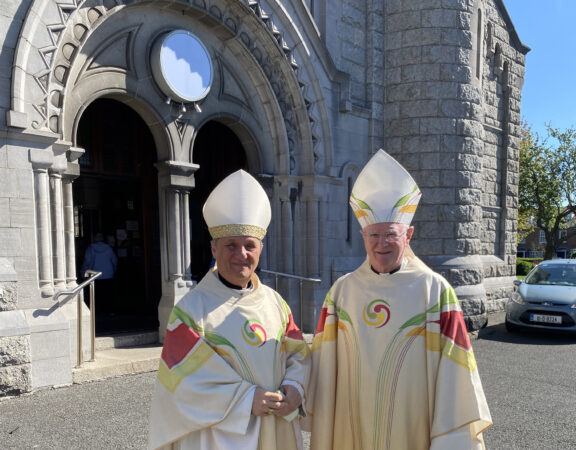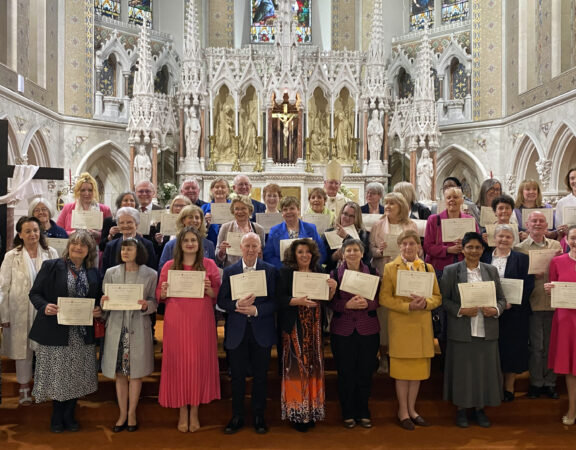The fundamental principle of any policy on social advancement is today therefore that of
. People are not the objects of social policy. They are its subjects. Subjectivity is of the essence of being human. Every individual is created with unique dignity, created in God’s image, male and female. Human beings in whatever their social situation are subjects with potential. The more individuals are enabled to realise that potential the better it will be for all.
This is why the Social Doctrine of the Church advocates the principle of inclusion as a fundamental principle for its action. That means that persons living in poverty or in situations of disadvantage must be looked on as brothers or sisters, having the same dignity and the same fundamental rights as I have. They want to be able to place their human talents at the service of their own future and that of their families. They want above all voice. They want to be the subjects of their own future and that of their communities.
This applies both within an individual nation, within our continent and on a global level. Globalization will be worthy of its name only if it enhances the unity of the human family. Any form of globalization which breeds exclusion, marginalization and gross inequality does not have the right to call itself global. Globalization has to be made the synonym of inclusive. An international community must be consistent in realising its commitments. Promises that are made regarding international development are promises made to the poor. Failure to keep ones word is failing the poor.
This means placing the human person at the centre of its concerns in the economic sphere. Again here we see the differentiated approach of Pope John Paul II. He recognises the basic nature of the modern business enterprise and the centrality of profit to such enterprise. He notes that when a firm makes a profit, it means that productive factors have been properly employed. Inefficient use of resources is a form of moral irresponsibility. Inefficient use of public funds and resources is very often just another form of corruption. And as always the first victims of corruption are the poor.
But again the Pope stresses that profitability is not the only indicator of the condition of a business enterprise (cf.
Centesimus Annus, # 34). “It is possible”, the Pope says, “for the financial accounts to be in order, and yet for the people, who make up the firm’s most valuable asset – to be humiliated and their dignity offended”
The business enterprise, according to the Pope, is above all a community of persons. He stresses that where the conditions of that community are not good, this can actually have negative repercussions on a firms economic efficiency.
When I first read those paragraphs, I felt that perhaps this was perhaps easy to apply these to a small family enterprise where everyone knows everyone else. But what of a huge modern multinational enterprise or even a smaller local enterprise where the workers may be scattered around the world working on various levels of subcontract?
But then I realised that we have to apply these fundamental principles also to the realities of today. We cannot say that because I do not know my workers directly, as in the old family business, I no longer have responsibility concerning them. Conscience and social responsibility cannot be outsourced. To make this possible we need new forms of international cooperation to provide realistic but robust norms for worker protection. The International Labour Organization has how this is possible. It is much more difficult to situate this question in ongoing trade negotiations.
Public opinion is also important here. When consumers begin to tell us that they are not just concerned with the designer label on their sports shirt, but also the labour conditions within which it was made, then the business community will respond more rapidly. Public opinion and especially consumer opinion can have an important effect on globalization and on the place we want to see assigned in the process to people and to the environment. The Social Teaching of the Church must bring its contribution to the process of educating and enlightening public opinion.
Let me come back from global realities to our own island of Ireland. What does it mean in Ireland today to talk about “a shared humanism based on solidarity”, to use the title that has been assigned to my talk here today. A particular challenge that we in Ireland have to face is how to foster a new vision of inclusion on our own island. I am referring to North-South relations and the future place of the various religious and cultural traditions in Ireland, no matter what the particular political context.
Irish politics has tended at times to look at the “national question” and the “economic question” as separate. The nature of a modern economy will inevitably bring home to us that the future of the Irish economy will depend on the integration of all on this island into a functioning, albeit complex, economic unit. To do this we will have to move from a culture built up on misunderstanding and exclusion to one of solidarity and inclusion. In its turn this will require a new culture of sensitivity to the way in which different groups in our society understand themselves.
There is no way in which we in the South can treat the situation in Northern Ireland as if it did not concern us. An all-Ireland economy would benefit through the revitalization of the traditional industrial heritage of the North. But our concern should not appear as some kind of subterfuge take-over attempt from Dublin. Economic unity does not require the abandonment of particular identities as the European experience has shown us.
The fact of economic interdependence, especially within the framework of the European Union and the growing multicultural reality of the island, inevitably means that the notion of being Irish will change. We have to work to ensure that people who come from beyond our shores to seek a better life and who contribute to our economic and social development are treated with dignity and are welcomed to become protagonists of a common future. It would be sad if at the same time Irish people of different cultural or religious background felt that they were less appreciated and welcomed or that they could not maintain their own cultural identity.
Violence, intimidation, hatred and exclusion are not the signs of a mature political culture. Catholic Social Doctrine, according to Pope Benedict XVI must become “a set of fundamental guidelines that are valid beyond the confines of the Church” (#27). It must strive to become a shared humanism based on solidarity, drawing also from the various Christian denominations who belong to our Ireland and with whom we share the same citizenry on an equal footing. The challenges of secularism make the fact of religious divides on our island all the more scandalous and frustrating. We need to move forward to seek new ways of working together, of understanding difference and of rejoicing in it. The political process must be accompanied by a more active community process, in which communities work together, not afraid of setbacks along the road.
The Social Teaching of the Church has to be tested on the ground. The principles are there. We need people to take up the challenge in a wide range of areas, in different contexts. One of my mentors, Cardinal Roger Etchegaray, always said that after the publication of a social encyclical the writing of the next encyclical begins the following day, not on the desk of the Pope, but in the lives of active Christian lay men and women who begin testing the teaching in the realities of the world in which they live.









